Modern Thinkers
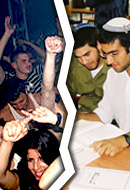 Beyond “Religious” and “Secular”
Beyond “Religious” and “Secular”Wednesday, May 11, 2011 by Yehudah Mirsky | Jewish Ideas Daily » Daily Features
What should be the place of the Jewish religion in a Jewish state? There are many putative answers to this question, and the answers have changed over time. When Zionism was still an aspiration, a great blank yet to be filled in, the terms of debate were set by a self-confidently secular dispensation preoccupied with state- and institution-building. In the first few decades of statehood, religion, though state-established, was clearly subservient.
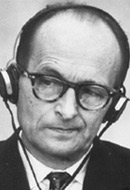 Eichmann Goes Digital
Eichmann Goes DigitalMonday, April 18, 2011 by Alex Joffe | Jewish Ideas Daily » Daily Features
This year, on the fiftieth anniversary of the Eichmann trial, Yad Vashem, the Holocaust Martyrs' and Heroes' Remembrance Authority, together with the Israel State Archives, has posted to YouTube an extraordinary series of videos: over 200 hours of courtroom sessions and testimonies in the original Hebrew, German, and Yiddish, as well as a parallel set with English voiceover. What do they tell us?
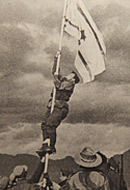 A Chosen People?
A Chosen People?Tuesday, April 12, 2011 by Aryeh Tepper | Jewish Ideas Daily » Daily Features
Within months of Israel's lightning victory in the June 1967 war, French President Charles de Gaulle was asked for his judgment of the dramatically new situation created by the triumph of the Jewish state over its enemies. Still smarting from Israel's refusal to heed his advice and wait passively for the Arab armies to attack, de Gaulle labeled the Jews "an elite people, sure of themselves and domineering."
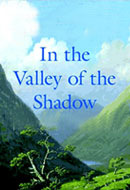 “The Sickening Question”: God, Cancer, and Us
“The Sickening Question”: God, Cancer, and UsMonday, April 4, 2011 by Eve Levavi Feinstein | Jewish Ideas Daily » Daily Features
Many scholars of the Bible and ancient Judaism prefer to focus exclusively on ancient texts and the world that produced them, refraining from engaging with the implications of their work for contemporary religious life. James L. Kugel has never been one of those scholars.
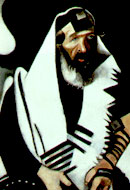 Three Blessings
Three BlessingsWednesday, March 23, 2011 by Yehudah Mirsky | Jewish Ideas Daily » Daily Features
The Jewish prayer book (siddur) is thick with texts: blessings, thanksgivings, and petitions, instructions, theological claims, and historical memories. Some traditional texts bear especially outsized burdens. In this respect, few can rival three lines that begin "Blessed are you O God, King of the Universe, Who has not made me . . . " and conclude, respectively, "a goy [Gentile]," "a slave," and "a woman."
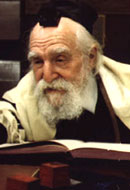 Halakhah for Americans
Halakhah for AmericansFriday, March 18, 2011 by Elli Fischer | Jewish Ideas Daily » Daily Features
Asked in a 1975 New York Times interview how he had acquired his standing as America's most trusted authority in Jewish religious law (halakhah), Rabbi Moshe Feinstein (1895-1986) replied: ''If people see that one answer is good and another answer is good, gradually you will be accepted."
 Identity = ?
Identity = ?Thursday, March 10, 2011 by Yehudah Mirsky | Jewish Ideas Daily » Daily Features
In discussions of that elusive entity known as "Jewishness," few terms have become so ubiquitous, and as a consequence so elusive, as "Jewish identity." The phrase regularly serves as the name of a communal dream: the wished-for end product that vast apparatuses of education, institution-building, and programming aim to instill and perpetuate. But what is it?
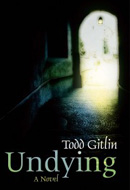 The Last of the Red-Hots?
The Last of the Red-Hots?Tuesday, March 8, 2011 by Sam Munson | Jewish Ideas Daily » Daily Features
The past decade has witnessed a seeming revival in the fortunes of America's old, new, and newest Left. Some elders, notably including Bill Ayers, have enjoyed career recrudescences. One of the better-known spokesmen and avatars of this revitalized political culture is the veteran writer and activist Todd Gitlin.
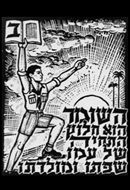 The Old Young Guard
The Old Young GuardMonday, March 7, 2011 by Aryeh Tepper | Jewish Ideas Daily » Daily Features
One of the most significant movements of Jewish renewal in the 20th century was Hashomer Hatzair: the Young Guard. Founded as a youth group in Vienna in 1916, the movement set itself in opposition to what it regarded as the emaciated character of Jewish life.
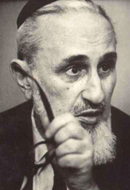 The Virtuoso of Judaism
The Virtuoso of JudaismThursday, March 3, 2011 by Yehudah Mirsky | Jewish Ideas Daily » Daily Features
Religious virtuosity comes in many forms. One of them is the ability to reconcile seeming irreconcilables, like faith and freedom, piety and intellect, revelation and science. The dream of synthesis has lured many in the past two centuries. One who seemed to live it was Joseph B. Soloveitchik.
Editors' Picks
Toward a Jewish Humanism Shai Held, Haaretz. The moral philosophy embraced by a religious-Zionist leader in the mid-20th century is in urgent need of revival.
Contending with Catastrophe Allan Nadler, Forward. Legal and philosophical responses by Orthodox rabbis to the devastating consequences of the 9/11 attacks range from the arcane and casuistic to the sagacious, humane, and uplifting.
Choose Life, Choose Work Haim Amsalem, Jerusalem Post. Traditional Jewish sources unequivocally stress the virtue of work and the value of earning a living. Any movement teaching its children only Torah is a modern aberration.
Is Judaism a Religion? Leora Batnitzky, Jewish Week. A common assumption is that Judaism began as a religion and only gradually grew into something more broad. But this has it exactly backward.
Rabbi in the New World Lawrence Grossman, Forward. Contradictions, or at least inconsistencies, marked Joseph B. Soloveitchik's involvement in virtually every major issue that confronted modern Orthodoxy.
Right of Reply Joseph J. Siev, Huffington Post. On the heated response of a prominent Reconstructionist rabbi to my article concerning the present condition of his movement.
Unorthodox Orthodox Matchmaker Cindy E. Rodriguez, Time. A rabbi has devised a way to help homosexual men fulfill their dream of becoming husbands and fathers while remaining in good standing with Jewish religious law.
By Faith Alone Israel Drazin, Jewish Ideas and Ideals. The late Rabbi Yehuda Amital was an influential Israeli educator, instrumental in integrating yeshiva study with military service, and an opponent of rabbis' setting public policy.
The Self-Centered Life Gil Student, Torah Musings. Why observe the Torah's commandments? Because, says an Orthodox rabbi channeling Oprah, they make you feel good about yourself.
Protestant Mishnah Amit Gevaryahu, Talmud Blog.
Can the ancient rabbinic code of law be studied on its own, apart from the commentaries, deliberations, and disputes of the Talmud?

